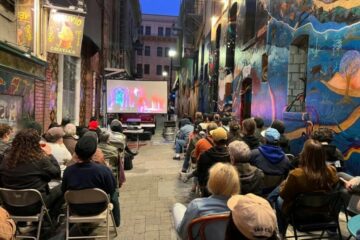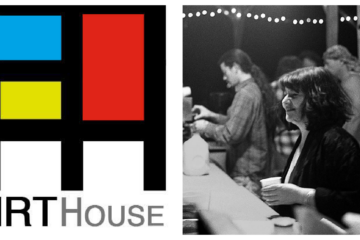The City That Was: Pranking Time Magazine with The Fantasia Protest
In The City That Was, Bohemian Archivist P Segal tells a weekly story of what you all missed: the days when artists, writers, musicians, and unemployed visionaries were playing hard in the city’s streets and paying the rent working part time.
As April Fools’ Day approaches, I’m unavoidably reminded of my old friend Peter Doty, one of the most inspired pranksters to ever get in the face of the general public. I’ve mentioned him before in these columns, because he was the instigator of—among other things—the Let Them Eat Cake event that landed me, very temporarily, in jail. April Fools’, however, brings to mind another one of Peter’s more absurd Cacophony pranks, The Fantasia Protest, and the reason for that is, as you might imagine, the punch line of this story.
Back in the days when the city still had lots of movie theaters, and people actually went to the movies, Walt Disney’s Fantasia was shown frequently in rep houses. Peter went one night with his roommates, Sarah Rosenbaum and Robert Hubbard, and their joint fertile imaginations riffed on how many things about the Disney classic could be seen, by the politically correct, as offensive. At that time in the city’s history, political correctness was a big, tedious thing, and it raised equal parts of respect and contempt among the Cacophony crowd.
In retrospect, it was kind of nice for people to make a point of being careful about offending others—or destroying the planet—since there’s hardly enough concern about it these days. We’re so desensitized by constant acts of gratuitous violence that shooting people barely raises eyebrows any more. Eviscerating people on the Internet is standard operating procedure, and healthy, civil debate is extinct. But at the time of the Fantasia Protests, the necessity of always being politically correct just seemed so completely humorless.
For The Fantasia Protest, Peter assumed the identity of Dwayne Newtron, an ostensible concerned parent and the head of the organization, Sensitive Parents Against Scary Movies (SPASM), who was particularly offended by the terror children experienced in the Night on Bald Mountain segment of the film. Other equally inspired collaborators protested the waste of water in the Sorcerer’s Apprentice section (the Bay Area Drought Relief Alliance Party, or BAD RAP), the dancing hippos in tutus, and so on. Peter got everyone to make up their own organizations and protest signs, and arranged for them to picket theaters on given nights, every time one of them screened the film. They also picketed a video store that had a big Fantasia window display. The owner thanked them afterwards; he said he’d never sold so many copies of the movie as he did during the protest.
Local Journalism for Working stiffs
We write for the poets, busboys, and bartenders. We cover workers, not ‘tech’, not the shiny ‘forbes 100 bullshit’. We write about the business on your corner and the beer in your hand. Join the Bay's best newsletter.
Not long after these events, just about everyone was over political correctness and it started attracting official scorn in the major media. Time Magazine published a story about “a nation of whiners and crybabies,” in which they outlined all the excesses of complaint that had popped up all over the country. A full third of the article was devoted to the most ridiculous, gratuitous political correctness of all: San Francisco’s unbelievably whiny identity politics, as exemplified by those people who protested a beloved movie for children. Peter, with the help of a lot of our clever friends, had pranked the living hell out of Time. A local columnist, Rob Morse, also wrote about the protest’s absurd political correctness, but he should have known better, as a resident of Cacophony’s playground.
It was a moment of glory for Cacophony. Unlike our predecessors in the Suicide Club, we loved publicity. Media mentions helped some of us advance our careers in the arts and gave us non-paying glimmers of celebrity, which were undeniably satisfying, even if they didn’t pay the rent. For some of us, publicity made global recognition possible, as in the case of Burning Man. Even more importantly, it brought attention to the sheer joy of unmediated play, an alternative to being only passive consumers of entertainment.
After the Time article appeared, Peter had the chance to get more media attention immediately. But he didn’t. He waited. A few days before April Fools’ Day the following year, he notified The Wall Street Journal about the abysmally shoddy fact checking at Time and other media outlets that had bought the protest—hook, line, and sinker. Needless to say, the WSJ editor Peter spoke to—who covered all the “three-headed goat stories”— was very, very happy to break the news.
Peter Field, the unofficial archivist of Cacophony history, got this photo at one of the protests.

Howdy! My name is Katy Atchison and I'm an Associate Editor for Broke-Ass Stuart.
I want to take the time to say thank you for supporting independent news media by reading BrokeAssstuart.com. Supporting independent news sources like Broke-Ass Stuart is vital to supporting our community because it amplifies the voices of a wide variety of diverse opinions. You also help support small businesses and local artists by sharing stories from Broke-Ass Stuart.
Because you're one of our supporters, I wanted to send over a pro-tip.
Our bi-weekly newsletter is a great way to get round ups of Broke-Ass Stuart stories, learn about new businesses in The Bay Area, find out about fun local events and be first in line for giveaways.
If you’d like to get our newsletter, signup right here, it takes 5 seconds.









